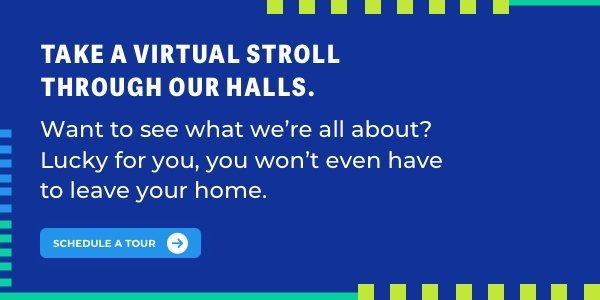What are Charter Schools and How Do they Work Online?
Charter schools are jumping in popularity, and online learning is exploding in all directions. Still, if you’re like most parents, you may not understand what charter schools are—or how they work online.
That’s a scary unknown if you’re trying to pick out the best learning environment for your child. We’re here to clear up the confusion and give you a glimpse into the world of online charter schools. In this article, we pin down exactly what charter schools do and how they work online.
What Is a Charter School?
There’s a lot of confusion about what charter schools are and what they aren’t. Many parents confuse charter schools with private schools. Others simply don’t realize how they’re any different from traditional public schools. Here’s what a charter school is and how other school systems work:
Traditional Public Schools
Technically, charter schools are also public schools. However, “traditional public school” usually refers to institutions that are tied directly to school districts and public funding. Traditional public schools are regulated by the government and a geographically based school board.
Charter Schools
Charter schools are also free and open to the public, but they aren’t bound to a school district. Instead, leaders draft a charter that’s approved by an independent board. That means charter schools are free to use flexible teaching models and can promptly make structural adjustments because decisions run through a more local process than in traditional public schools.
Private Schools
Private schools are privately funded and usually rely on tuition to operate. They generally set their own standards, aren’t regulated by the government, and often require an application process in order to attend.
With these differences in mind, it’s not hard to see why charter schools have become increasingly popular in recent years. In fact, from 2000 to 2018, the number of U.S. charter schools has more than tripled. Now there are more than 3.2 million students enrolled in charter schools. As more parents wake up to the benefits of charter schools, it appears demand is rising.
Common Myths About Charter Schools
Wondering how charter schools work? It helps to clear up some common misconceptions about charter schools to get a grip on their role. Here are some common myths about charters and why they’re incorrect:
1. Charter schools are unregulated.
It’s true that charter schools aren’t tied to the rigid standards set by school districts. However, that doesn’t mean they are unregulated. Charter schools have independent boards that will craft a charter that the school needs to uphold. At the same time, charter schools also have to abide by national laws and government regulations.
2. Charters aren’t public schools.
One of the biggest misunderstandings about charter schools out there is that they aren’t open to the public. In reality, charters are open to the public, just as traditional public schools are.
3. Charters charge tuition.
Because they’re both nontraditional types of schools, many people confuse charter schools with private schools when it comes to tuition. As a result, many parents wrongly assume charter schools charge tuition. However, like traditional public schools, charters are open and free to the public.
4. Charters don’t support diversity.
Many wrongly think charter schools use a selection process or cherry-pick students from rich neighborhoods. Again, this is a major misunderstanding. Charter schools admit students based on the region they live in, similar to traditional public schools. And statistics show that charter schools are actually often more diverse than private and traditional public schools. According to the National Center for Education Statistics:
- There are more than three times the number of public charters with 50 percent enrollment of Black students than private schools.
- There are nearly five times more public charter schools with 50 percent Hispanic student enrollment than private schools.
How Do Charter Schools Work Online?
Few parents realize how online public charters work online. Still, there are some unique features that help the best charter schools run online. Here are a few little-known features of online charter schools:
Self-Paced Learning
The best online charters pair one-on-one learning with self-paced learning. These programs adjust to the student’s learning needs and let the student advance at a pace that suits them. That way, students are able to tackle concepts more quickly or spend more time on difficult subjects.
Socialization Programs
Most online programs aren’t widely known for their socialization programs, but advanced online charters will feature programs built for social growth. That can include everything from learning tiles and active clubs to interactive online dashboards.
Flexible Scheduling
With online charter schools, students aren’t packed into a rigid daily bell schedule. Instead, students can learn within a schedule that fits their goals and learning preferences. This is a big advantage for student athletes and performing artists because students can schedule classes around travel, practice, or events. It’s also a big plus for homeschool students who are comfortable learning in a more flexible environment.
What Are the Advantages of Online Charter Schools?
Not all charter schools operate online. However, when they’re run right, online charter schools can combine the best advantages of online learning and the charter system. Here are some advantages to choosing an established online charter for your learner:
1. Personalized Results
The best online charters will feature small classrooms, targeted learning, and self-paced programs. By avoiding packed, impersonal classrooms, students can get the individual attention that sparks meaningful learning outcomes.
2. Targeted Learning
Advanced online charters will use technology that lifts pressure off of instructors. By combining self-paced learning, in-depth progress reports, and one-on-one check-ins, teachers can tailor learning to your student’s needs or goals.
3. Convenient Student Schedules
The strict bell schedule that comes with traditional schools can be more than an inconvenience for parents and students. Early class times can also cut into critical sleep schedules, especially if your student has extracurricular events to attend. Online charters let students and parents manage their schedules in a way that is healthier, more convenient, and maximally productive.
What Are the Disadvantages of Online Charter Schools?
Make no mistake, not all online charter schools will be set up to help your student succeed. In fact, some online charter schools can end up standing between your student and positive learning outcomes. Here are some potential challenges to watch out for when you’re picking out an online charter school:
1. Socialization Programs
Social skills are critical to a student’s development, but it takes effort and expertise to implement socialization programs online. Many schools that are new to online learning don’t prioritize socialization or assume social development will happen naturally online. This can cause your student to miss out on critical social skills.
Before you pick out an online charter school, be sure to check out their extracurricular and socialization programs. The best schools will be staffed by distance learning experts and will offer dedicated programs for social growth.
2. Quality of Learning
Just as with any school, you should make sure your online charter provides a quality curriculum before you enroll. Especially when you’re dealing with online schools, it’s important to make sure the institution isn’t a diploma mill that will leave your student underprepared after graduation.
Wondering how to ensure the school is reputable?
Check to see if it’s accredited by a major learning body. It is also worth seeing if its coursework is approved by entities such as the NCAA or UC A-G system. These approvals all indicate your student will receive an education that sets them up for success in the future.
3. Class Size
Unfortunately, as more and more schools move online, many are pressuring instructors to lead packed digital classrooms. Not only does this leave instructors overwhelmed, but it also means your child likely won’t get the attention they need to grow. That’s why it’s important to make sure your online charter school offers small class sizes, targeted learning, and self-paced learning programs.
Answer All Your Questions About Online Charters
If you’re considering moving your student to an online charter, you’ll want to know everything you can about the learning environment. At Method Schools, we want to see your student succeed. Here’s a little bit more about our online learning charter environment:
- We’re accredited by the Western Association of Schools and Colleges (WASC)
- We focus on small classrooms led by distance learning experts
- Coursework is NCAA- and UC A-G-approved
- We use targeted learning, self-paced programs, and socialization growth
Want to learn more about Method Schools or how online charter schools work? Connect with one of our distance learning experts today.




-1.svg)
-1.svg)
.svg)
.svg)
.svg)

.svg)










.svg)
.svg)





